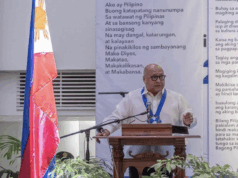REP. JOSE MA. S. SALCEDA, the ways and means committee chair from Albay’s 2nd district, said the Corporate Income Tax and Incentives Reform Act (CITIRA) will be rendered ineffective by the Department of Trade and Industry’s (DTI) proposal to implement a longer transition period for current fiscal incentives.
The DTI has said that it will push for a longer transition period, of up to 10 years for firms already availing of the incentives.
“The DTI position stands in the way of achieving (CITIRA’s goals). That is the ultimate priority of the House Committee on Ways and Means. If we extend the transition period for the 3,150 firms receiving incentives, we will have to delay the reduction in corporate income tax (CIT) for 1 million (small firms) for fiscal prudence,” Mr. Salceda said in a statement Monday.
The bill seeks to cut the current 30% corporate income tax rate — described as the highest in the region — by one percentage point every other year to 20% in 2029.
He said around 50% of the tax savings under CITIRA are expected to be reinvested in domestic trade, boosting economic growth in 2022-2029, generating as many as 1.56 million additional jobs.
The measure also aims to attract more foreign direct investment by bringing down the corporate income tax rate to parity or even lower than the prevailing rates in Southeast Asia.
“Reducing the corporate income tax rate is a national imperative. So is attaining A-minus credit rating by 2022. Hindi po puwedeng (We cannot) extend the sunset period and also lower the CIT at the same time. Luging-lugi po ang gobyerno at ang taumbayan. (The government and the people stand to lose a lot),” Mr. Salceda said.
The CITIRA bill is an offshoot of the bill formerly known as the Tax Reform for Attracting Better and High-quality Opportunities (TRABAHO). It was fast-tracked in the House under House Rule 10, Section 48, which allows expedited deliberations on legislation that reached third reading in the previous sitting of Congress.
CITIRA is now awaiting second reading.
Mr. Salceda said that he is pushing for the rationalization of incentives “to correct the current unfair system in which just over 3,000 companies registered with investment promotion agencies (IPAs) — a number of them on the elite list of Top 1,000 corporations — get to enjoy discounted income tax rates of 6 to 13% while many of the country’s micro, small and medium enterprises (MSMEs) that actually employ most of Filipino workers have to pay the standard CIT rate of 30%, which is the highest in the region.”
Perks now offered to economic zone locators consist of a four- to eight-year income tax holiday; a special tax rate of 5% on gross income after the tax holiday expires; tax- and duty-free importation of capital equipment, spare parts and supplies; exemption from wharfage dues as well as export tax, duty, impost and fees; and eased restrictions on employing foreign nationals.
The Finance department estimates that such incentives cost the government about P1.2 trillion between 2015 and 2017, P301.2 billion in 2015, P380.7 billion in 2016, and P441.1 billion in 2017.
The Philippine Economic Zone Authority (PEZA) — which last year had the second-biggest value of committed projects after the Board of Investments — accounted for P879.1 billion, or 78%, of the P1.2-trillion total. — Vince Angelo C. Ferreras



